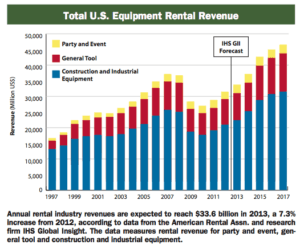SMART EQUIPMENT DEALERS ARE INCREASING PROFITS THROUGH SUPERIOR RENTAL MANAGEMENT
“Running a rental division requires a hefty financial investment, so the last thing most dealers want to do is purchase and maintain a separate rental system. ASPEN’s Rental component is part of a complete dealership management system, so it allows dealers to effectively manage their rental business using the same system they use to manage the rest of their dealership’s departments. “
According to the American Rental Assn. (ARA), the equipment rental industry is growing, and equipment dealers are encouraged to look to rental as a growth opportunity.
Tom Hubbell, ARA’s vice president of marketing and communications, quoted from in a recent article published in Rural Lifestyle Dealer Magazine, says, “The financial crunch a few years ago had folks saying, ‘I don’t want to own things. I don’t want the capital on my books.’ Ultimately, there has been a shift toward renting as a way of doing business as opposed to just renting for a specific task.” It also gives customers the opportunity to try out certain types of equipment that they may not yet be ready to buy.

Attract More Business by Adding Rental to Your Mix
By capitalizing on this trend and adding rental to their business “mix,” equipment dealers can accommodate their existing clientele as well as attract more new business. Hubbell says rental can be a natural business add-on for equipment dealers, as they are generally already equipped to store and maintain the equipment. But before dealers jump on the bandwagon, they should be prepared to manage this additional aspect of their business. In response to this need, some dealership management system vendors, like Charter Software—who continue to adapt their product to reflect industry changes—are now adding rental functionality to their software.
Have the Right Tools in Place to Manage Rental
Anne Salemo, President of Charter Software says, “More and more equipment dealers are finding that renting out equipment is a great way to boost revenue, stay competitive, and accommodate their customers’ needs when their equipment is down. But meeting the demands of large-scale rental customers requires strong rental capabilities that may not be available in their business system.”
“Rental requires a hefty financial investment, so the last thing dealers want to do is purchase and maintain a separate rental system, says Salemo. “The Rental component in our ASPEN system has very flexible features that are designed to help dealers to more effectively manage their rental business and maximize their return on investment and avoid the cost and maintenance of another system,” she says.
For example, ASPEN’s robust financial utilization reporting allows dealers to better analyze and make timely decisions such as when to expand or transfer units out of their fleet. Dealers can track rental income by market segment, equipment type, and other configurable categories. Also, dealers can quickly respond and take action on lost sales as they can be recorded right from ASPEN’s rental calendar.
Some of the other standouts of the component that may not be available in other rental systems include the ability to rent units with multiple durations and bill recurring rentals for repeat business. This really helps dealers to best serve their large-scale customers. Flexible billing options and customizable rate matrices, and the allowance for additional capacity in order to rent non-rental units are yet some other unique features in the system that help dealers to meet their customers’ needs. Also, repeat customers can enjoy the convenience of having multiple types of units/durations on one contract, and easily swap units and/or receive billing adjustments without requiring a new contract.
“We are always striving to help dealers increase their revenue with better business management tools, and try to help dealers to avoid the need to perform work outside their business system whenever possible,” says Salemo. Tasks like managing depreciation that are traditionally done using spreadsheets are available right from the ASPEN business system. Whether opting for scheduled depreciation, on-demand depreciation, or depreciation as a percentage of rental income, ASPEN monitors that cost basis never goes below designated salvage value.
An integrated CRM component in the ASPEN system further alleviates the need for separate customer management software by providing dealers the ability to send mass-email, prepare and track quotes, and gain unique insight into sales trends right from within the system. Says Salemo, “Keeping all these aspects of managing the dealership within one software system not only saves dealers the cost of additional software, it increases their efficiency as well as their income stream by providing them with access to real-time, integrated data from all departments.”
Dealer Takeaways:
- Build your rental inventory based on market needs and dealership strengths.
- Establish sound legal contracts, rental procedures and a way to monitor performance.
- Check your insurance policy to see if it covers rental equipment or purchase separate rental insurance.
Tips to Get Started from Tom Hubbell:
“The first strategy for anyone considering rental is to be able to answer the question, ‘What’s the market in my area?’ Talk to your customers to understand their needs, wants and desires,” says Hubbell.
Dealers face tough competition from rental-only stores, both those that are independently owned and nationwide chains. To compete, dealers need to understand and market their dealerships’ strengths.
He suggests using the website www.rentalhq.com. The site allows renters to enter the kind of equipment they’re looking for and their location. Dealers can use it to understand the competition in their area. ARA also just released its Equipment Rental Penetration Index via its Rental Market Monitor. The tool is available to members and helps companies measure the rental potential in their area.